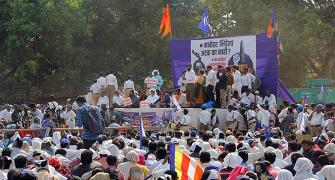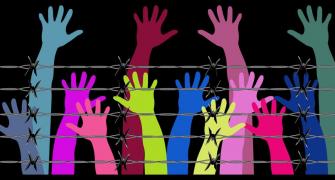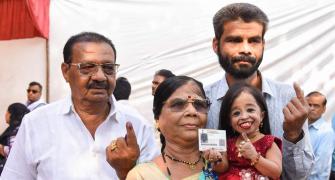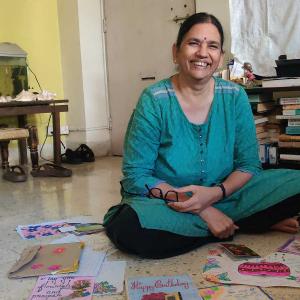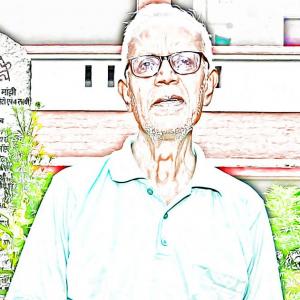'Just waiting outside the prison gate, thinking that your mother is inside those walls even though you know she is innocent, affects your psyche.'

There were some things Koel Sen never dreamt she would ever do.
But life turned upside down for the film-maker and columnist when her mother Professor Shoma Sen was arrested in March 2018 for her alleged involvement in the Bhima Koregaon case. Professor Sen was, as a consequence, suspended from her post as head of the English literature department at Nagpur University.
From prison visits, to dealing with extensive paperwork, to worrying about her mother's deteriorating health, Koel has been dealing with multiple challenges.
"The first two years were extremely difficult; it took a long time to get accustomed to the fact that I had to go to jail to meet her.
"Many of the people who are in prison are undertrials. But this fact is ignored. You are considered the 'family member of a criminal' because you are waiting to see someone who is in prison. They look at you as if you are guilty," Koel tells Rediff.com Senior Contributor Neeta Kolhatkar in a multi-part interview.
We heard of your mother's condition for the first time from Sudha Bharadwaj (a lawyer, an activist and a trade union leader, Bharadwaj -- who was arrested and charged in the Bhima Koregaon case -- was released earlier this year on conditional bail; she and Professor Shoma Sen were incarcerated at the same time at Pune's Yerawada Central Jail and Mumbai's Byculla Jail). It is only through a co-inhabitant or their families that we learn of the conditions in jails. Does your mother talk to you about her health problems?
Yes, she tells me.
But, as a daughter, I know there are things she doesn't talk about because she is concerned about the impact it will have on me. For instance, there were things that Sudha told me about Ma that Ma herself hadn't shared -- instances like when Ma felt giddy after her blood pressure went down.
I understand Ma's predicament. She hides those kinds of things from me because she is a mother. She is always thinking about what she should tell me and what she shouldn't.
That's why, when I came to know about this incident, I asked Sudha to tell me how Ma really is and what her problems are so that I am better prepared.
Have the authorities taken any steps to give her medication or ensure a complete medical check-up?
To be honest, the authorities are not bothered; they don't care about what's happening to the prisoners.
It is up to Ma to try and see that she is taken to (Mumbai's) J J Hospital for her treatment (Professor Sen is now a prisoner at Byculla Jail). She has to keep telling them that she has a specific ailment; she has to keep detailing her medical problems.
Also, they are always taken to an intern at a government hospital because prisoners, though they don't say it, are considered second class citizens. The interns are young and don't have much experience.
Aur qaidi ko check karna matlab pehle se hi doctor log dar jatey hain (Doctors are petrified because they have to check a prisoner).
Sudha too mentioned that doctors are scared to examine them because they are coming from a prison. Now imagine explaining your symptoms to the doctor under these circumstances.
I don't think Ma is getting good treatment for her eyes.
She has glaucoma and, before she was arrested, she was under treatment from one of the best ophthalmologists; not everyone can treat this eye condition.
Also, for this ailment, the doctor needs to see her in person. I don't even know which doctor in J J is responsible for her treatment.
At our end, we are continuing with the medication from our doctor. But he hasn't been able to examine her since she was arrested so we don't know how her condition is now. No tests have been conducted.
These kinds of things make you worry constantly about her health.
Sometimes, Ma mentions some good things too. Once, we were lucky to get a good doctor. Otherwise, this is the way they are treated.
In how many jails have you visited Professor Sen in the four years since she was arrested? What were these visits like?
She has been in two jails only; the first one was Yerawada in Pune and second is the Byculla Jail in Mumbai. So I have visited only women's prisons.
The first two years were extremely difficult; it took a long time to get accustomed to the fact that I had to go to jail to meet her.
Just waiting outside the prison gate, thinking that your mother is inside those walls even though you know she is innocent, affects your psyche a lot.
The presence of the prison walls, the prison structures, the uniformed people, the way they look at you -- all of it gives you a huge shock. You go through immense pain.
Even the way you, as a visitor, are treated is -- to a certain extent -- violent. Many of the people who are in prison are undertrials. But this fact is ignored. You are considered the 'family member of a criminal' because you are waiting to see someone who is in prison. They look at you as if you are guilty.
The fact that someone you know is inside makes you, in a strange way, feel guilty too.
You are grappling with all these mixed emotions and with the overwhelming hope that you might get to see and speak with your loved ones.
There have been times when children have not been allowed to meet their mothers who are in prison; the wailing child is left outside because a certain timing, or a certain requirement, has not been met.
When you see such things, you feel luckier than most because so many people are facing problems and challenges that are so much worse.
I have also had nice moments at Yerawada where I have had conversations with women.
What about Byculla Jail?
The visits to Yerawada were more frequent because Ma had just been shifted there. We made many visits to give her clothes and medicines. All of us, including Ma, had to get used to the fact that she was inside prison; it was a shock for her too.
The move to Byculla was very sudden. She was shifted immediately after the case was taken over by the NIA (National Investigation Agency). That shift happened between January-February 2020 and, soon after, the national lockdown was imposed because of the pandemic.
Since then, I have been able to visit her only four or five times.
There have been annoying circumstances at the Byculla Jail, especially about regulations. They keep bringing up something new every single time.
When Ma was shifted to Mumbai, I had to get a police verification to prove that I am her daughter despite the fact that I had met her at least 15-20 times at Yerawada. My records are there in their prison system. So why do they force me to do this new paperwork to prove I am her daughter all over again?
During the lockdown, there were limited days on which I could visit her. Yet, they made me run around for this new police verification.
As a result, I was allowed to meet her only once a month whereas I could have met her four times if I didn't have to follow up on the paperwork which already existed in their records.
It just gets so frustrating; you end up feeling helpless.
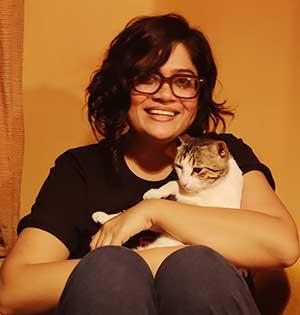 IMAGE: Koel Sen. Photograph: Kind courtesy Neeta Kolhatkar
IMAGE: Koel Sen. Photograph: Kind courtesy Neeta KolhatkarHow did all this affect you? How did you keep yourself together?
I used to get anxiety attacks and faced bouts of depression because of these situations. I had to be put on medication initially and, yes, it has taken a toll on my life and my work.
In the initial phase, till 2020, I was bad shape.
Slowly, one becomes stronger and resistant to the hoops they keep putting you through, like unnecessary paperwork and chasing for permissions.
On rare occasions, when the person on the other side is ignorant, the process has been smooth.
Usually, the police see the kind of case your family member is arrested for -- if it is under the UAPA (Unlawful Activities (Prevention) Act) or MCOCA (Maharashtra Control of Organised Crime Act), then they make the rules more stringent.
Since ours is a UAPA case, compulsory police verification has to be done.It is a form of harassment.
- Part III: 'I have to get Ma out of prison'
Feature Presentation: Ashish Narsale/Rediff.com


